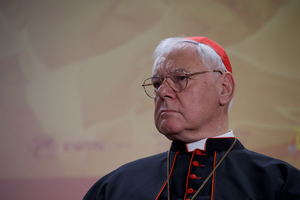German Catholic Relief Agencies Fuel Synod’s Push for Change
Working through REPAM, which has been assigned a key role in organizing the synod, the German Church agencies have provided substantial funding related to the controversial upcoming Pan-Amazon synod.

VATICAN CITY — The heads of two German Church aid agencies, which the Register has learned have made significant financial and other contributions toward preparing for the Pan-Amazon Synod, have said the October meeting will be an “unmistakable signal of departure” for the Church.
In a joint foreword to the German translation of the synod’s working document (instrumentum laboris), the chief executives of Adveniat and Misereor, respectively the German bishops’ relief agency for Latin America and the bishops’ overseas aid and development agency, said the upcoming meeting “will show that change is possible in politics, the economy, technology and, last but not least, in the Church.”
The synod is “about responding to the challenges of the times by listening to the Spirit who demands the lives of men, peoples and creation as a whole be defended,” wrote Father Michael Heinz and Pirmin Spiegel in the foreword, published July 17.
They added that the working document called for “a profound change in the Church” and that “what will be discussed in Rome will have significance for the Church worldwide.”
The aid agency heads also say the synod document calls for “decentralization so that local churches can decide for themselves what directly concerns them, in accordance with the principle of subsidiarity.” It calls for a Church “that leaves its comfort zones and goes to the peripheries, where people count for nothing and have no rights,” they add. “It is a matter of implementing the program of Evangelii Gaudium,” Pope Francis’ 2013 apostolic exhortation.
Their comments follow those of Adveniat’s president, Bishop Franz-Josef Overbeck of Essen, who said earlier this year that the synod will lead the Church to a “point of no return,” and, thereafter, “nothing will be the same as it was.”
The Oct. 6-27 synod, the theme of which is “Amazonia: New Paths for the Church and for an Integral Ecology,” will comprise all the bishops from the vast region that encompasses Bolivia, Brazil, Ecuador, Peru, Colombia, Venezuela, French Guyana, Guyana and Surinam, along with experts, heads of relevant Vatican Curial departments and several papal appointees.
Cardinal Lorenzo Baldisseri, the secretary-general of the Synod of Bishops, told reporters at the launch of the meeting’s working document last month that the meeting will be a time of “pastoral reflection, open to recognizing diversity” and “listening to the Amazonian reality, with all its cultural and ecclesial facets.”
The synod is expected to place great emphasis on listening to Amazonian indigenous peoples and drawing attention to the hardships and sufferings they face, such as human exploitation, environmental degradation and the destruction of the Amazonian rainforests.
But the working document has stirred considerable controversy, with German Cardinals Gerhard Müller and Walter Brandmüller branding it heretical.
In an analysis published this week, Cardinal Müller, a former prefect of the Congregation for the Doctrine of the Faith (CDF), also criticized the document for describing the Amazon as a source of revelation. Such an assertion, he said, is a “false teaching.”
And in earlier July 7 comments to the Register, Cardinal Müller noted how heavily influenced the working document is by European theologians, particularly German-speaking ones, who, he said, are keen to resurrect old theological theories. “We heard all these ideas 30 years ago,” he observed.
Particular areas of controversy in the document include a clear push to ordain married men of proven virtue but without seminary formation, ostensibly to address a shortage of priests in the Amazon region (critics see this as a means to force an end to mandatory Latin Rite priestly celibacy through the back door), as well as the document’s treatment of ecological issues and its distortions of inculturation.
It also invites the participants to “reconsider” the linking of Church authority with her sacramental, judicial and administrative duties, especially holy orders, and speaks of an “official ministry” to be conferred on women.
REPAM’s Role
A key organization in the preparation for this synod has been the Pan-Amazonian Ecclesial Network (REPAM), of which Misereor and Adveniat are a part.
Set up in 2014 (three years before Pope Francis had officially announced the synod) by CELAM (the Latin American Episcopal Council), CLAR (Confederation of Latin American Religious), Caritas Latin America, and the bishops’ conference of Brazil, REPAM’s aim has been to “bring to the world’s attention the fragile situation of indigenous people in the Amazon and the critical importance of the Amazon biome to the planet — our common home.”
But the more practical purpose of the network, whose president is the synod’s general relator, Brazilian Cardinal Claudio Hummes, has been to prepare for the synod, including helping to draft the working document.
The network was “formally entrusted to support the secretariat of the synod in the process of active and direct listening, in the gathering of information in an adequate manner,” outgoing Vatican spokesman Alessandro Gisotti told the Register July 10.
This was done “to help in the elaboration” of the synod’s “preparatory document (lineamenta) and the working document (instrumentum laboris),” he said, adding that this was carried out through a “listening process” of various contributions, in order to “encourage the greatest possible participation of the various actors in the process.”
Since its founding, REPAM has also held 45 assemblies with indigenous peoples, rural communities, social movements and pastoral workers across the region’s nine countries.
‘A Closed Group’
But critics, such as Cardinal Müller, have pointed to weaknesses in the network.
In his July 16 analysis, the former CDF prefect said it is “a closed group of absolutely like-minded people, as can easily be gleaned from the list of participants at pre-synodal meetings in Washington and Rome, and it includes a disproportionately large number of mostly German-speaking Europeans.”
He also affirmed the body was “tasked with the preparation” of the working document, adding it “was founded for that very reason in 2014.”
Its work is also continuing in setting the agenda for the synod, after the publication of the working document. In late June, REPAM held a controversial private “study meeting,” during which the issue of ordaining married men figured highly, as did the possibility of ordaining women as deacons.
A third of the participants were German-speaking prelates or experts known to be sympathetic to these theological positions. Among those attending was retired Austrian Bishop Erwin Kräutler of the Territorial Prelature of Xingu in Brazil, whom Pope Francis appointed as an expert consultant to the synod.
Bishop Kräutler, REPAM’s Brazilian director who is thought to have helped write the synod’s working document, said in an interview with Austrian television this week that one consequence of the synod will be “that regional bishops’ conferences receive the right to ordain to the priesthood married men.” He also said women should “at least” be “ordained as female deacons,” which “would be a beginning.”
German Funding
As members of REPAM with significant resources, both Misereor and Adveniat have been heavily involved in the network’s activities. Adveniat spokeswoman Carolin Kronenburg told the Register July 16 that the organization “supports several REPAM projects financially and therefore the preparatory meetings for the Amazon synod.”
She disclosed that for the 2018 financial year and “in preparation for the synod,” Adveniat supported “nine projects and REPAM activities with a total of €272,000 [$307,000].” Kronenburg added that Adveniat, which last year had a total income of almost €50 million ($56 million), made “further funds” available “after the closure of the budget (Sept. 30, 2018) and in previous years.”
Adveniat has also “collected questions, suggestions and topics from 85,000 local people at numerous preparatory meetings in the Amazon region,” Kronenburg said. “Adveniat therefore supports the participation of the people in the Amazon synod, and therefore their commitment to safeguarding creation in the fight against violence done to the earth,” she added.
Ralph Allgaier, a spokesman for Misereor, stressed the agency is “not co-financing the Amazon synod” nor does it have any “mandate for such financing,” but he added that “various projects coming out of REPAM’s partner organizations receive funding from Misereor.” Last year, the agency had a total income of €232 million ($260 million).
Others, however, have been noticeably guarded about discussing financing of the synod. The Holy See Press Office did not address the issue when asked, but explained the background of REPAM instead.
The Register also contacted the office of Cardinal Hummes to ask about financing for the meeting and whether REPAM had been created in 2014 with the synod in mind, but didn’t receive a reply. Cardinal Baldisseri was asked the same questions, but he was away, and no one else from the office responded. Caritas Internationalis, whose Latin America office helped found the network, also did not respond.
Edward Pentin is the Register’s Rome correspondent.
- Keywords:
- edward pentin
- german church
- pan-amazon synod


















